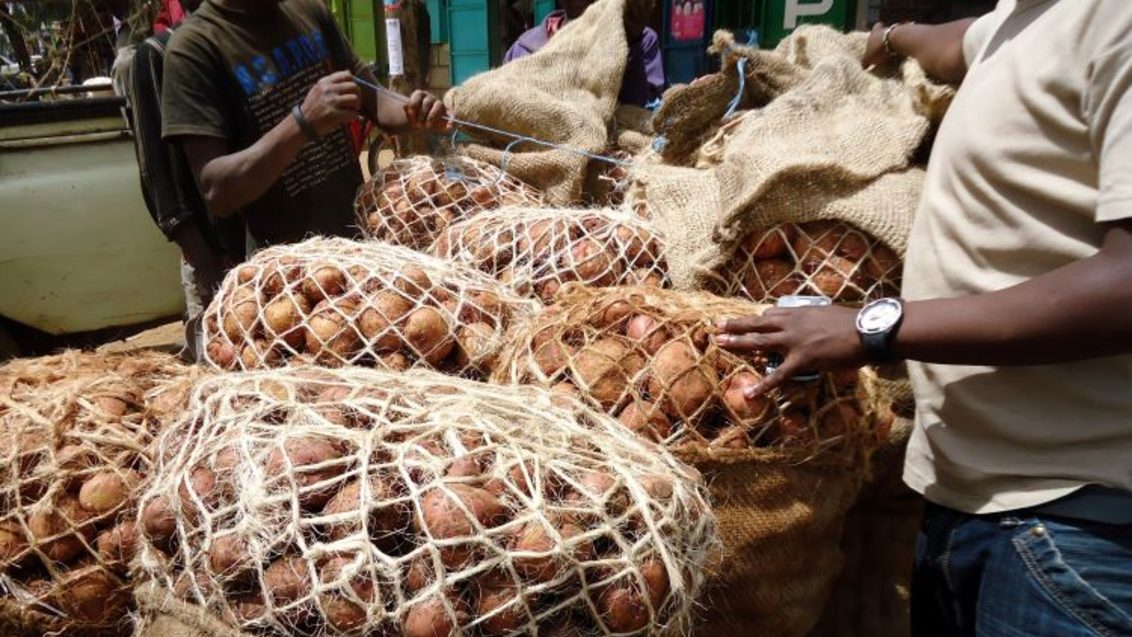PASTTA bags more potatoes

Kenya’s crucial maize crop faces many challenges. Potatoes are an excellent alternative, but yield needs to increase. PASTTA* is busy helping.
For years, the main source of starch in many Kenyan households has been maize (corn). It accounts for about 65% of the population’s calorie intake**. Recently, however, there has been an acute shortage. Among the causes are new diseases and pests, such as Maize Lethal Necrosis Disease and Fall Armyworm.
“If we continue relying on maize there’ll be a crisis that will be difficult to manage”, predicts Stacy Mwangala, the PASTTA Deputy Chief of Party at SFSA. “Farmers should be encouraged to grow other nutritious crops that fill the gap. Potato is a candidate. But its potential to feed the nation is still largely untapped.”
One reason why potato is a good alternative to maize is its ease of use. This is important because Kenya’s urban population is growing rapidly. “Kenyans in big towns rely heavily on fast-cooking foods, to match the pace of daily life”, Stacy comments. “Potato is easy to prepare, cook and consume. That’s why PASTTA has been doing trials and field demonstrations with varieties suitable for the urban table, and for crisp-manufacturers.”
On potatoes, SFSA has a long-standing collaboration with Kisima Farm in Meru County. “The farm multiplies certified, disease-free seed, and has built a cold store”, explains Victoria Johnson-Chadwick. She is ad interim Head of our Seeds2B team, which is involved in PASTTA. “Local smallholders can therefore now access good potato seed at an affordable price. Kisima seed enables them to increase their productivity and income. With the extra money, farmers can educate their children, build better houses, install electricity and buy transport or equipment.”
Involvement in PASTTA has been good news around Kisima Farm. “We’ve raised our production of certified seed, thanks to purchasing tractors and harvesters”, says a farm representative. “As well as helping us serve more neighbouring smallholders, the increase in potato acreage has also resulted in more jobs on the farm. And processors benefit from better supply.”
At special Field Days, PASTTA staff educates smallholders on good agricultural practices. Topics include planting of certified seed and proper land use. Importantly, however, the farmers also witness the benefits on their own farms. “They see their production rise thanks to purchasing certified potato seed”, Stacy Mwangala reports. “Previously, they were planting only saved seed, which was often diseased. As a result, they were only getting about four tons per hectare. With new certified varieties, they are now growing 8-15 tons.” That is still some way off the varieties’ full potential of 25-30 tons per hectare. But additional new varieties and agronomic training should help raise yield further.
PASTTA is also helping potato-farming expand into areas traditionally dominated by pastoral cattle-grazing. For instance, trials in Samburu and Sultan Hamud have proved that potatoes can perform well in these regions. Farmers previously unfamiliar with the crop now have an alternative to depending entirely on increasingly risky pastoralism.
Interested in East African potato production? Watch our film.
PASTTA works on other crops as well. Here's a soybean story.
*PASTTA is the Partnership for Seed Technology Transfer in Africa between USAID and the Syngenta Foundation for Sustainable Agriculture (SFSA). It primarily focuses on transferring seed-related technologies to smallholders, in order to increase their harvests and income.
**National Nutrition Action Plan 2012-2017, Ministry Of Public Health and Sanitation, 2012.
